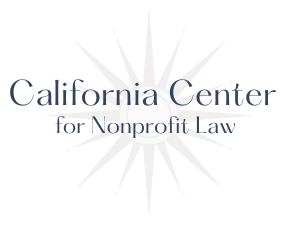
Basic Nonprofit Board Member Duties and Responsibilities
Boards are fundamental to the governance of a nonprofit corporation. However, many misconceptions exist about their function and the duties and responsibilities of board members. As a result, nonprofits may need help properly defining the role of a board member and the board as it relates to proper oversight of the nonprofit and meeting all legal requirements.
The California Center for Nonprofit Law is here to inform you about the measures that you must follow to ensure your charitable organization remains compliant with the law. We will advise you of any steps you must take and help you implement them to remain up-to-date and in good standing with all pertinent governmental entities. Contact us today at (949) 892-1221 and see how we can help.
Structure of the Nonprofit Board
According to CA Corp. Code §5213, a nonprofit board should include the following positions, no matter the size or type of board:
- Chair of the Board (or President, or both with duties distributed to both)– leads the board, facilitates meetings, and, unless otherwise specified in the articles or bylaws, serves as the general manager and chief executive officer of the corporation
- Secretary – records meetings, assumes responsibility for all official communications with board members, and certifies corporate records as accurate
- Treasurer / Chief Financial Officer (or both) – handles all matters related to the organization’s finances, property, and budget
- Any other officers with titles and duties as shall be stated in the bylaws or determined by the board and as may be necessary to enable it to sign instruments
Each board must ensure that any board member filling any of these positions fully understands the duties and responsibilities of those positions. A member filling one of these positions must perform those duties, and the rest of the board should hold that member accountable for executing those duties.
General Nonprofit Board Member Duties
Individual board members have general legal and fiduciary duties that they must follow, which include the following:
- Duty of Care – exercising one’s best judgment in actively participating in making decisions on behalf of the organization
- Duty of Loyalty – putting the interests of the organization above one’s personal and professional interests when making decisions on behalf of the organizations
- Duty of Obedience – ensuring that the organization complies with all local, state, and federal laws, and follows its mission statement
These legal principles generally apply to determine whether a board member’s conduct was proper or improper if a board member is accused of misconduct. As such, all board members are held to these standards of behavior.
Specific Board Member Duties
Individual board members also have specific duties that they generally should perform as board members, such as the following:
- Regularly attending board meetings and organizational functions;
- Prepare for board meeting by reviewing agenda, minutes, financial reports, and other reports;
- Serving on committees or task forces and taking on related assignments or tasks as needed;
- Publicly advocating on behalf of the organization; and
- Follow board policies.
Specific Board Duties
Nonprofit boards also have specific duties that they typically carry out to fulfill their basic responsibilities as a board. These duties include the following:
- Create a clear mission statement that articulates the organization’s purpose, goals, and communities to be served;
- Select a chief executive officer to operate the organization daily;
- Provide support and periodic evaluation of the executive officer’s work;
- Engage in short and long-term planning processes to support the organization’s goals;
- Monitor the applicability of programs to the organization’s mission, as well as their effectiveness;
- Assure that the organization is financially healthy and is prudently protected from financial and safety risks. Those risks include ensuring that there is adequate insurance coverage and overall safety challenges for the organization are met;
- Develop an annual budget, monitor adherence to that budget, and ensure that proper financial controls are in place to protect organizational assets;
- Build an effective board by establishing set standards for new members, orienting new members, and conducting self-evaluations;
- Adhere to legal and ethical standards; and
- Provide public support to the organization.
Allow Us to Meet Your Legal Needs
The California Center for Nonprofit Law dedicates its efforts to the daily legal matters that charities face, including ongoing compliance with local, state, and federal law. Call us today at (949) 892-1221 and schedule a time to discuss your case. Get your questions answered and learn more about how we can help.
